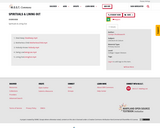
African American Literature 1619-1926
- Subject:
- Literature & Culture
- Material Type:
- Primary Source
- Author:
- Carolyn Shuttlesworth
- Date Added:
- 06/29/2020
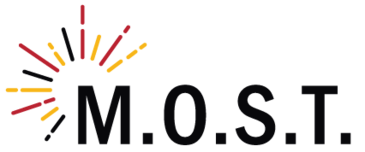
Maryland Open Source Textbook Initiative OER
These OERs were created through grants provided by the Maryland Open Source Textbook Initiative.

African American Literature 1619-1926

African American Literature 1619-1926

This is the second course of a two-course sequence in biology intended for majors. This course explores mechanisms of evolution, diversity and classification of life, population and community ecology and selected vertebrate body systems.This course has adopted the OER textbook "Biology 2e" from OpenStax.
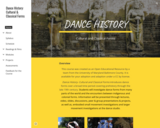
Overview
This course was created as an Open Educational Resource by a team from the University of Maryland Baltimore County. It is available for your adoption and adaption under a CC by license.
Dance History- Cultural and Classical Forms introduces dance forms over a broad time period covering prehistory through the late 19th century. Students will investigate dance forms from many parts of the world and the encounters between indigenous and colonial forms. Information will be presented through lectures, video, slides, discussions, peer & group presentations & projects, as well as, embodied small movement investigations and larger movement investigations at the dance studio.

This OER is an overview of important items for students entering college for the first time. It is a helpful guide for topics ranging from time management and critical thinking, to financial literacy.
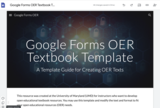
This resource was created at the University of Maryland (UMD) for instructors who want to develop open educational textbook resources. You may use this template and modify the text and format to fit your open educational resources (OER) needs, whether that is a complete textbook or a single chapter of information. The purpose of this resource is to provide a flexible and free resource for instructors that can promote and facilitate the creation and use of open educational resources.
We teach open science and have used this template to create an OER introduction to statistics textbook (Numbers don't lie (but people do), https://sites.google.com/umd.edu/statisticsinsocialsciences/home), an OER R textbook (Learning R the EZ way, https://sites.google.com/umd.edu/ezlearning-r/home), and an undergraduate research dissemination textbook (Addressing Grand Challenges through open science research, https://sites.google.com/umd.edu/umd-open-science-research/home?authuser=0). We hope others will find this resource useful as well.
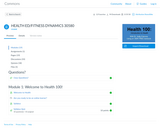
Introduction to Health using an OER Health Textbook. Includes 16 modules with video introductions, readings, discussions questions, quizzes, and assignments exploring all aspects of health including food, exercise, relationships, stress, addiction, and disease.
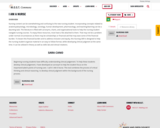
Nursing content can be overwhelming and confusing to the new nursing student. Incorporating concepts related to anatomy/physiology, microbiology, sociology, human development, pharmacology, and teaching/learning can be a daunting task. The literature is filled with acronyms, charts, and organizational tools to help the nursing student navigate nursing courses. To enjoy these resources, most have a fee attached to them. That may not be a problem under normal circumstances as there may be scholarships or financial aid that may ease some of the financial burden. To lessen this financial burden and to address inclusion and equity, this Nursing OER is designed to help the nursing student organize material in an easy to follow format, while developing clinical judgment at the same time. It can be utilized in theory as well as skills lab and clinical rotations.
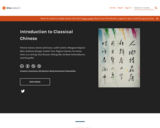
This textbook was first compiled by Professor Patrick Hanan at Harvard University in 1984. In the introduction, Professor Hanan acknowledged his appreciation to those who had contributed to the completion and revision of the book. Since then many graduate teaching fellows and professors from the department of EALC at Harvard have provided invaluable suggestions for the revision of this textbook.
Introduction to Classical Chinese was produced with support from the Rebus Community, a non-profit organization building a new, collaborative model for publishing open textbooks. Critical to the success of this approach is including mechanisms to ensure that open textbooks produced with the Community are high quality, and meet the needs of all students who will one day use them. Rebus books undergo both peer review from faculty subject matter experts and beta testing in classrooms, where student and instructor feedback is collected. This book has been peer reviewed by the contributors, the book editors, and their students in the classroom.

This project was part of the Western Maryland M.O.S.T. Institutional Grant (2020). While it focuses primarily on a 100-level Introduction to Literature course, the open resource and subsequent assignments could easily be adapted for upper-level undergraduate literature courses. Furthermore, the design of this project allows instructors to continue to utilize texts with which they are most familiar.
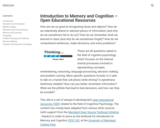
How are we so good at recognizing faces and objects? How do we selectively attend to relevant pieces of information (and why do we sometimes fail to do so)? How do we remember what we learned in class (and why do we sometimes forget)? How do we comprehend sentences, make decisions, and solve problems?
These are all questions asked in the field of cognitive psychology, which focuses on the internal mental processes involved in representing concepts, remembering, reasoning, language processing, decision making, and problem solving. More specific questions include: Is it safe to talk on a hands-free cell phone while driving? Is eyewitness testimony reliable? How can you better remember information? What are the pitfalls that lead to bad decisions, and how can they be avoided?
This site is a set of always-in-development open educational resources (OER) related to the field of Cognitive Psychology. The content has mostly been adapted from various other sources (with support from the Maryland Open Source Textbook Initiative - thanks!) in order to serve as the textbook for Introduction to Memory and Cognition PSYC 341 at the University of Maryland, College Park.
As OER they are completely free for students (and anyone else) to use and/or revise/redistribute.
The goal of these materials (and the corresponding PSYC 341 course at UMD) is to promote a good understanding of current theories and debates that motivate research in cognitive psychology, understand which research methods are appropriate to address different questions in the field, and have an improved ability to understand and discuss this knowledge through class participation and assignments. We hope to do this in a way that allows you to see the relevance of cognitive psychological research and theories to your own lives.
If you are an instructor of a class related to cognitive psychology, these materials are free for you to use / adapt as you like – please see the GitHub README for some basic info on how to adapt these materials for your own purposes. If you are neither a student nor a teacher, well, I’m not sure why you’re here, but I hope you find this useful!
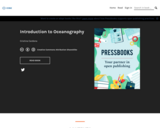
This book is a collection of Open Educational Resources adapted and edited by Dr. Cristina Cardona, Associate Professor of Physical Sciences at CCBC Essex.
Contributing authors:
Paul Webb, Roger Williams University
Miracosta College faculty
University of California, Davis (Hill et al.)
University of California, Davis (Keddy)
Steven Earle

Includes an attached common course cartdridge for an Introduction to Statistics for Psychology course adapted by Paul C. Bernhardt, Ph.D. for a PSYC 301 course at Frostburg State University. The course is an adaptation of Learning Statistics with jamovi, A Tutorial for Psychology Students and Other Beginners (Navarro & Foxcraft, 2019) and a free and open-source statistical analysis package named jamovi (www.jamovi.org).
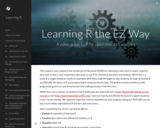
This resource was created at the University of Maryland (UMD) for instructors who want to teach, students (and instructors) who want to learn, and researchers who want to use R for statistical discovery and analysis. While this is a textbook, it is largely based on hands-on examples with video walk-throughs to take you through accessing R and RStudio, the basics of R and progressing to analyses with step by step templates and video support. The goal is to build confidence with programming early on and demonstrate best coding practices from the start.
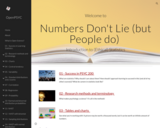
This resource was created for Introduction to Statistics students at the University of Maryland, and is designed to help you explore psychological theory, research, and practical applications of statistics. After completing this course in psychology, you will be able to:
- Explain how to use and interpret descriptive and inferential statistics in an ethically responsible way.
- Describe the difference between descriptive (central tendency, dispersion, correlation) and inferential statistics (single, multiple, logistic), and know when to use each.
- Demonstrate analytical skills by critiquing research and media claims.
- Apply statistical concepts and methods in a way that improves your own academic, personal, and professional life.
Each module is structured around key prompts - Learning Objective Questions - and followed by the links to articles, videos, and interactive demonstrations you will need to answer those questions. After studying the readings, videos, and presentations you should be able to answer the learning objective questions in detail without any notes in front of you. If you practice doing that regularly, you are well prepared for any assessment that your instructor can give you!
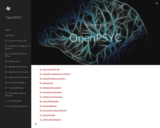
OpenPSYC was created by Drs. Scott Roberts, Ryan Curtis, and Dylan Selterman while at the University of Maryland to serve as a free alternative to a textbook for students in PSYC 100: Introduction to Psychology. It has been subsequently used and modified by their colleagues.
OpenPSYC is designed to help students explore psychological theory, research, and practical applications of psychological science. After completing this course in psychology, students will be able to:
- Explain patterns of thought and behavior in the context of psychological theories and provide scientific evidence to support their ideas.
- Describe the basic ethical principles that should guide scientific research on the thought and behavior of living organisms.
- Demonstrate analytical skills by critiquing psychological claims and designing valid research that could test their hypotheses.
- Apply psychological concepts and research findings in a way that improves their own academic, personal, and professional life.
Each module is structured around key prompts -- Learning Objective Questions -- and followed by links to the articles, videos, and interactive demonstrations students will need to answer those questions.

This is a comprehensive Personal Finance text which includes a wide range of pedagogical aids to keep students engaged and instructors on track. This text has an attitude: that in addition to providing sources of practical information, it should introduce students to a way of thinking about their personal financial decisions. The book is arranged by learning objectives. The headings, summaries, reviews, and problems all link together via the learning objectives. This helps instructors to teach what they want, and to assign the problems that correspond to the learning objectives covered in class. This text was adapted by The Saylor Foundation and Montgomery College under a Creative Commons Attribution-NonCommercial-ShareAlike 3.0 License without attribution as requested by the work’s original creator or licensee. The text has been made available as a Word Dcoument and as a PDF.
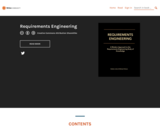
"Requirements Engineering: A Modern Approach to the Requirements Engineering Body of Knowledge" provides an insight into the process of defining and documenting requirements in the engineering design process. The book provides a broad view of existing software standards, practices and methods and an insight into evaluating and critiquing requirements for consistency and technical feasibility.
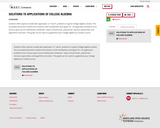
Students often express trouble with application, or "word", problems in typical College Algebra classes. This accessible document contains the solutions, both handwritten and typed, for 135 application problems from various open source mathematics textbooks. Topics include linear, polynomial, rational, exponential, and logarithmic functions. This guide can be used to supplement your College Algebra (or similar) course.

Addresses knowledge and skills required to engage with our digital landscape in an informed and critical fashion.